- Home
- Rachel Caine
Stillhouse Lake Page 13
Stillhouse Lake Read online
Page 13
I think about Mel less and less.
I'm glad when the temperature starts to cool on the slippery side of September. School reconvenes, and Connor and Lanny both seem happy. Whoever Connor's bullies were (and he's never confessed to me), his growing pack of friends more than makes up for it. They arrive every Thursday evening for their D&D game, which goes on well into the late hours. I'm delighted by their enthusiasm, their passion, their joy in imagination. Lanny pretends she thinks it's gross, but she doesn't; she starts checking fantasy books out of the library, and she lends them to him when she's done. She stops calling him Squirtle since his friends said they thought it was cool.
At the end of September, Sam and I sit in the late, late evening in the living room, watching an old movie. The kids are long off to bed, and I have a glass of wine in my hand, leaning against his warmth. It's is a sweet delight, this quiet peace. I'm not thinking, in that moment, about Mel, or about anything at all. The wine helps ease the constant, vigilant anxiety in me, and it blurs the fear, too.
"Hey," his voice says quietly by my ear. The tickle of his breath is a tease. "You still awake?"
"Very much," I say, then take another drink. He takes the glass from my hand to drain it. "Hey!"
"Sorry," Sam says. "I need a little courage right now. Because I'm going to ask you something."
I freeze. I can't breathe. I can't swallow. I can't run. I just sit, waiting for the mask to come off.
He says, "Do you mind if I kiss you, Gwen?"
My mind is blank. A snowfield on a glacier, cold and smooth and empty. I'm stunned by the silence inside, the sudden and violent recession of fear.
And then I feel warm. It happens in an instant, as if the warmth was there, waiting, all the time.
I say, "I'll mind if you don't."
It's a tentative thing at first, until we both get our confidence and our bearings. His lips are soft and strong at once, and I can't help but remember Mel's kisses, always somehow plastic. There's none of that studied movement. Sam kisses like someone who means it. He tastes of the rich, dark cherry flavors of the Bordeaux. Everything about that kiss makes me realize how little I know about life, how much I lost in marrying Melvin Royal. How much time I've wasted on him.
Sam is the one to break it, and he pulls back, breathing hard, saying nothing at all. I lean against him. He puts his arms around me, and instead of feeling confined, I feel included. Protected.
"Sam--"
He whispers in my ear, "Shh," and I don't say anything else. It occurs to me that maybe he's as afraid of this as I am.
I walk him outside after the movie. When he kisses me again at the foot of the house steps, it feels like a wonderful promise of better things to come.
A letter arrives from the remailing service the next day. I feel my pulse jump, but I'm not as anxious as before. I still take all the usual precautions: I slit the envelope open carefully, wear my blue nitrile gloves, and use utensils to unfold and hold open the paper.
This one is the second kind in the cycle, which I expected. Mel's words are blandly normal, like the mask of humanity. He talks about the books he's reading (he's always been a big reader, generally of obscure philosophy and the sciences); he laments the wretched, tasteless food in the cafeteria. He says he's fortunate to have friends who put money in his commissary account, so he can buy things to make his prison experience more pleasant. He talks about his lawyer.
But then . . . with a quiet curl of disquiet, I realize something is different about this letter. Something new.
When I get to the bottom, I see it. It's a stinger in the tail, and when it strikes me, it plunges its barb in deep.
You know, sweetheart, the thing I most regret is that we never got to have that house by the lake that you and I talked about so often. It sounds like paradise, doesn't it? I can almost see it, you sitting on the porch in the moonlight, watching the lake at night. That image gives me peace. I hope you're not sharing it with anyone else but me.
I think about the nights I've sat out there on my porch, drinking my evening beer and watching the ripples across the lake in the sunset. That image gives me peace, he says. I hope you're not sharing it with anyone else but me.
He's seen us--a photograph, at least. Seen me and Sam together on the porch.
He knows where we are.
"Mom?"
I flinch and drop the two spoons I'm holding to pin the letter down. When I look up, Connor is standing on the other side of the kitchen counter, staring at me. Behind him are Billy, Trent, Jason, and Daryl, his Thursday-night friends. I've forgotten what night it is. I'd intended to make Rice Krispies marshmallow treats, and I've forgotten that, too.
I quickly fold up the note, slip it back into the envelope, and strip off the gloves to three-point them in the corner trash can. I slip the envelope in my back pocket and say, "Boys, how about some snacks?" And they all cheer.
All except Connor, who's gone still and quiet, watching me. He knows something's wrong. I try a smile to reassure him, but I can tell he isn't fooled. With a sick sense of desperation, I try to order my thoughts while I whip together the marshmallow cream and Rice Krispies into their sticky pan, to the delight of the young men. My mind isn't on it, or on them, or on anything but what to do.
Run, all my instincts are screaming at me. Just get the van. Put the kids in it. Run. Start over. Make him find you again.
But the cold fact is that we have run. We've run and run and run. I've forced my children into an unnatural, damaging life that's cut them off from family, friends, even from themselves. Yes, I've done it to save them, but at what cost? Because looking at where they are now, a full year into being settled, I see them blooming. Growing.
Running cuts them off at the roots, again, and sooner or later, everything good in them will turn stunted and stained from it.
I don't want to run anymore. Maybe it's the house, which has become--despite my best efforts--home. Maybe it's the lake, or the peace I feel here.
Maybe it's the fragile, breakable, careful attraction I finally feel to a good man.
No. No, I'm not running, goddamn you, Mel. Not again. It's time to trigger a plan that I set in place a long time ago, one I'd hoped never to have to use.
As the boys eat their gooey snacks and roll dice, I step out and call a number that Absalom gave me years ago. I don't know whom it belongs to, and I don't even know if it will work at all. It's a failsafe, a nuclear option. Onetime use, and I paid dearly for it.
It rings, rings, goes straight to voice mail. There's no greeting, just a beep.
"This is Gina Royal," I say. "Absalom says that you'll know what I need done. Do it."
I hang up, feeling sick and dizzy, as if I'm standing on the edge of a very steep drop. That name, Gina Royal, it makes me feel like I'm falling backward, into darkness and a time I'd rather never existed. Makes me feel like all the progress I've made has been an illusion, something Melvin could take away from me anytime he wanted.
In the morning, I call the prison where Melvin is being held, and I make an appointment for the next visiting day.
5
I have to get someone to stay with the kids.
I think about it. I agonize about it for hours, staring into space, gnawing the inside of my lip raw. I have a few people I could ask, but few . . . so few. I could put the kids on a plane to their grandmother, I think, but when I check with her I find she's out of town on a trip. I need to make a decision. I can't leave Lanny and Connor alone, and I can't take them where I'm going.
It's an enormous step to take, a gigantic step for someone who doesn't trust anymore. I want to ask Sam. I question that very desire, because Mel has taught me I can't trust my own judgment, and the last thing I want, the very last, is to risk my kids.
I wish I knew more women, but the only ones I've become acquainted with in Norton or around the lake so far are chilly and unlikable, or outright hostile toward strangers.
I don't know what to do, and it paraly
zes me for a long, long time until finally Lanny throws herself into the chair in my office and stares at me for so long that I have to engage. "What, honey?"
"That was my question, Mom. What the hell?"
"I don't understand."
"Yes, you do," she says, staring harder. Narrows her eyes, in a way I know she got from me. "You're sitting in here chewing your thumbnail off. You hardly slept. What's wrong? And don't tell me I'm too young to know. Flush that noise."
Flush that is her newest phrase, and it makes me laugh. I imagine that will change to something much more direct by the time she's sixteen, but for now, it's a funny, useful phrase. "I need to go out of town," I tell her. "Just for the day. You'll mostly both be in school, but . . . but I need to leave super early, and I'm back very late. I need someone to be here for you." I take a deep breath. "Who would you suggest?"
She blinks, because she probably can't remember the last time I asked. And she won't, because that's not a normal question from me. "Where are you going?"
"Not important. Stay on topic, please."
"Okay, are you going to see Dad?"
I hate to hear her say that, like he's still Dad, with that hopeful upward curl in her tone. I makes me shudder, and I know she sees that, too. "No," I lie, with as bland and even a tone as I can. "Just business."
"Uh-huh." I can't tell if my own daughter believes me. "Okay. Well . . . I guess Sam would be okay. I mean, he's over here anyway, fixing stuff. He and Connor are still working on the deck, you know."
Hearing her say Sam's name is a huge relief. And besides, she's right; Sam would normally be here anyway. The deck project has taken on a leisurely pace, a little here, a little there. "I'm just--honey, I won't be here to watch out for you. If you feel at all uncomfortable . . ."
"Mom. Please." I get the full eye roll this time. "If I'd thought he was a creeper, wouldn't I have said so to his face? And to yours? Loudly?"
She would have. Lily was shy. Lanny is not. Something in me eases, though I know I can't afford to rely on a fourteen-year-old's judgment, however good I think it is.
In this, I can only rely on myself. I have to take a risk, and I flinch at the very idea. I take risks for myself. But with them? With them?
"Mom." Lanny is leaning forward now, and I see the earnest stillness in her. I see a ghost of the woman she will become. "Mom, Sam's fine. He's good. We're good. Just do it."
Just do it. I take in a deep, slow breath and sit back and nod. Lanny smiles slowly and crosses her arms. She does love to win.
"I'll watch him like a hawk," she tells me. "And I've got Javier and Officer Graham on speed dial. NBD, Mom."
NBD, I know, stands for no big deal. It is. But I need a leap of faith, and this time I take it. I pick up my cell phone and lock eyes with Lanny again as I dial the phone number.
He picks up on the second ring. "Hey, Gwen."
The normality and welcome of it steadies me, and my voice sounds almost normal when I say, "I need a favor."
I hear water running. I hear him shut it off and put something down to give me his full attention. "Tell me," he says. "I'll do it."
It's that simple.
"I'm only going to be gone for about twelve hours," I tell Sam on Sunday night, the night before I have to get on the plane, "but I appreciate you staying over. Lanny's responsible, but--"
"Yeah, but she's fourteen," he says. He takes a drink from the beer I've given him--a pecan porter, which he seems to prefer. Craft beers are a gift from God. I'm sipping a Samuel Adams Organic Chocolate Stout, creamy and smooth. It soothes the jitters in my stomach. "You don't want to come home to a trashed house and a mountain of beer cans, right?"
"Right," I say, though I doubt Lanny would even consider throwing a party. With me gone, she won't feel free, like most girls her age would. She'll feel vulnerable--and she is vulnerable. If her father knows where we are, if someone's really watching us on his behalf . . . I try not to think about it. I'm well aware that someone out there could be watching now. There are a couple of watercraft out on the lake in the sunset, making for shore. Maybe one of them has a camera trained on my porch. It makes me itchy. Mel will destroy this. He destroys everything.
But that is why I am going to visit him. To be absolutely sure he understands the stakes we are playing for now.
I haven't told Sam where I'm going. I wouldn't know how to even start that conversation. I also don't tell him I've set up wireless cameras. There's one focused on the front door, one on the back, one set back from the property on a tree to give a wide view, and one up high in an air-conditioning grille in the living and kitchen area. I can easily flip from one view to another on the tablet that came with them. In an emergency, I can e-mail the link to the Norton PD.
Not that I don't trust him. Just that I need some kind of reassurance.
I do say this: "Sam? Do you have a gun?"
I catch him in midgulp, and he turns to look at me with a curious expression as he coughs. I cock an eyebrow at him, and he turns it into a rueful laugh. "Sorry," he says. "Caught me off guard there. Yeah, I've got a gun, sure. Why?"
"Would you mind making sure you have it with you while you're here? I'm just--"
"Worried about leaving your kids? Yeah. Okay. No problem." Still, he continues to watch me, and his voice drops a little. "Any specific threats I need to know about, Gwen?"
"Specific? No. But--" I hesitate, thinking how to put it. "I feel like we're being watched. Does that sound crazy?"
"Around Killhouse Lake? Nope."
"Killhouse?"
"Don't blame me for that one. Blame your daughter. I think one of her goth buddies came up with it. Catchy, isn't it?"
I hated it. Stillhouse was plenty creepy enough for me. "Well, just--take care of them, that's all I ask. I'll be gone less than twenty-four hours."
He nods. "I might work on that deck some, if that's all right."
"Sure. Thanks."
On impulse, I reach out to him, and he takes my hand and holds it for a moment. That's all. It isn't a kiss. Isn't even a hug. But it's something strong, and it makes both of us sit for a moment savoring it.
He gets up eventually, draining the last of his pecan porter, and says, "I'll be back early morning before you leave, yeah?"
"Yeah," I agree. "I leave for Knoxville at four a.m. The kids will be off to school by eight, and they can get themselves up and on the bus. You'll have the place to yourself until they're back at three. I'll be in sometime after dark."
"Sounds good. I'll be sure to eat all your food and watch only the highest-dollar pay-per-view. Mind if I buy a bunch of stuff on your account on the shopping channels?"
"You know how to party, Sam."
"Damn right I do."
He gives me a full, sweet smile and leaves to walk up the hill toward his small cabin. I watch him go, hardly aware that I'm smiling, too. It feels normal.
Normal, I think, as the smile finally fades, is so dangerous now. I'd been fooling myself into thinking I could live in that world, but my world is the one beneath, the one in the shadows, the one where nothing is safe or sane or permanent. I'd almost forgotten that with Sam. If I stay here, I am helping my kids, but I'm risking everything, too.
There are no good answers, but this time I'm not just going to be strong. I'm hitting back.
The next day I take an eye-wateringly early morning flight from Knoxville to Wichita, where we once lived, and from there I drive a rental car to El Dorado. It's got a strangely industrial feeling, like a large manufacturing campus surrounded by miles of nothing, but there's no mistaking what it really is once you see the shimmering fences around it in a lace ruff of razor wire. I've never been here before. I don't know how to do this. The air smells different, and it reminds me of my old life, my old house that's long gone. It was foreclosed on by the bank while I was in jail. A month after that, someone had set it on fire and burned it to ruins. There's a memorial park there now.
When I want to punish myself, I loo
k at the spot where I once lived on Google Maps. I try to overlay the house on top of the park from memory. It seems to me that the large stone memorial block sits in the center of what had once been Mel's garage and killing floor. That seems appropriate.
I don't take the detour to look on the way to El Dorado. I can't. I am focused on one thing and one thing only as I follow instructions from the guard on where to park, what I can take inside with me. I've left my Glock locked in my Jeep's gun safe back in Knoxville, and all I have with me now are the clothes on my body, a preloaded cash card for $500, phone and tablet computer, and my old Gina Royal ID.
I endure the sign-in process, where my ID is scrutinized, my fingerprints are taken, and I am subjected to stares and whispers from not just the prison staff but other women coming to see family. I don't meet anyone's gaze. I am an expert at being remote. The guards are certainly interested. I've never been to see Melvin before. They'll be hotly discussing it up and down the corridors.
Next, everything but my clothes is taken and stored in a guard station, and then I'm strip-searched; it's a humiliating, invasive process, but I grit my teeth and get through it without complaint. This is important, I think. Mel likes to play chess. This move, this visit, is my checkmate. I can't afford to flinch at the cost of making it.
Dressed again, I'm shown to another waiting room, where I pass the time reading a dog-eared gossip magazine left by some woman before me. It's an hour before a guard appears to summon me on--he's young and hard-faced, this one, with sharply clinical eyes. African American. A bodybuilder, I think. Nobody I'd want to cross.
He leads me into a small, claustrophobic booth with a stained, worn counter, a chair, a phone fastened to the cubicle wall. Scratched, thick Plexiglas for a barrier. There's a whole row of booths, and desperate people sit hunched in every one of them, searching for some peace, some humanity in a place that offers none of that. I hear whispers of conversation as I go. Momma's not feeling right . . . brother's been locked up for driving drunk again . . . Can't afford to pay the lawyer this time . . . I wish you could come home, Bobby, we miss you.
I sink into the chair without feeling it, without thinking, because I'm looking through the cloudy plastic barrier at Melvin Royal. My ex-husband. The father of my children. A man who swept me off my feet with charm and grace, who proposed to me in a swinging bucket on top of a Ferris wheel at the state fairgrounds--and it doesn't escape me now that he'd waited until I was stranded and isolated to do it. I'd thought it wildly romantic at the time. I can guess he found it fun to imagine me plummeting to the ground, or arousing to have me completely at his mercy.

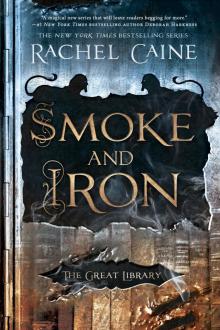 Smoke and Iron
Smoke and Iron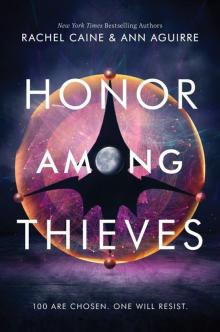 Honor Among Thieves
Honor Among Thieves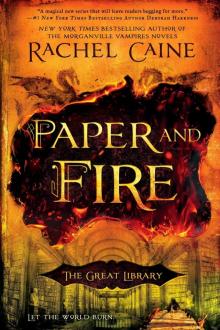 Paper and Fire
Paper and Fire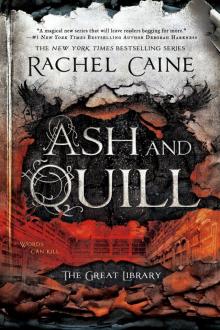 Ash and Quill
Ash and Quill Wolfhunter River (Stillhouse Lake Book 3)
Wolfhunter River (Stillhouse Lake Book 3) Undone
Undone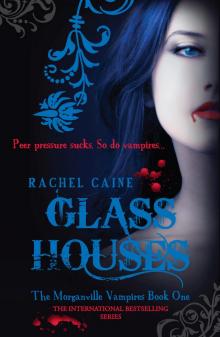 Glass Houses
Glass Houses Prince of Shadows
Prince of Shadows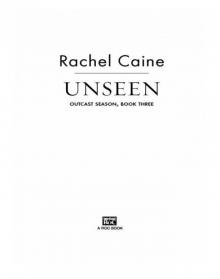 Unseen
Unseen Midnight at Mart's
Midnight at Mart's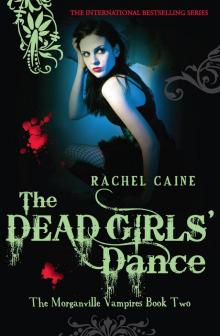 The Dead Girls Dance
The Dead Girls Dance Last Breath
Last Breath Stillhouse Lake
Stillhouse Lake Daylighters
Daylighters Midnight Alley
Midnight Alley Black Dawn
Black Dawn Fall of Night
Fall of Night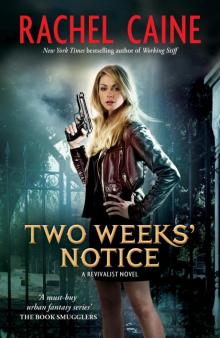 Two Weeks Notice
Two Weeks Notice Bitter Blood
Bitter Blood Carpe Corpus
Carpe Corpus Kiss of Death
Kiss of Death Ghost Town
Ghost Town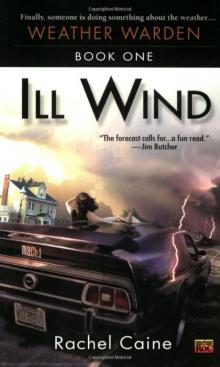 Ill Wind
Ill Wind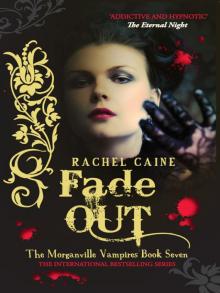 Fade Out
Fade Out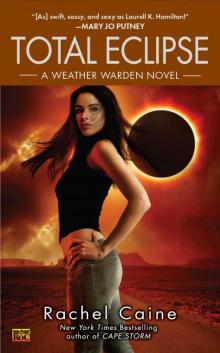 Total Eclipse
Total Eclipse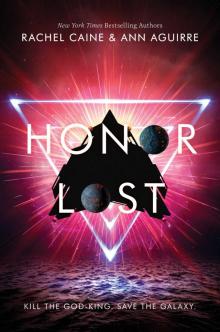 Honor Lost
Honor Lost Thin Air
Thin Air Black Corner
Black Corner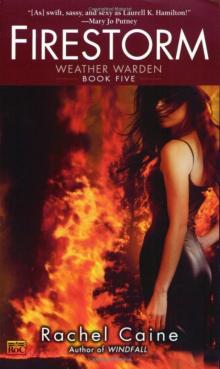 Firestorm
Firestorm Bite Club
Bite Club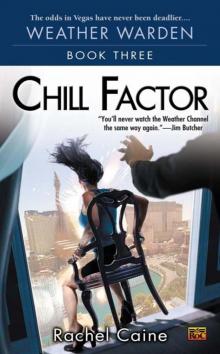 Chill Factor
Chill Factor Windfall
Windfall Oasis
Oasis Devils Bargain
Devils Bargain Terminated
Terminated Feast of Fools
Feast of Fools Lord of Misrule
Lord of Misrule Devils Due
Devils Due Ladies' Night
Ladies' Night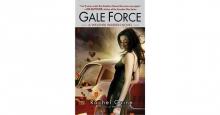 Gale Force
Gale Force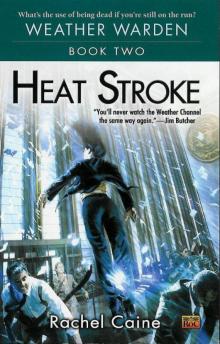 Heat Stroke
Heat Stroke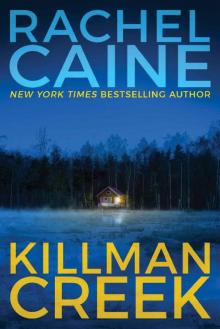 Killman Creek
Killman Creek Sword and Pen
Sword and Pen Cape Storm
Cape Storm Unbroken
Unbroken Windfall tww-4
Windfall tww-4 Heartbreak Bay (Stillhouse Lake)
Heartbreak Bay (Stillhouse Lake) Daylighters: The Morganville Vampires
Daylighters: The Morganville Vampires Duty
Duty Honor Bound
Honor Bound Unseen os-3
Unseen os-3 Firestorm tww-5
Firestorm tww-5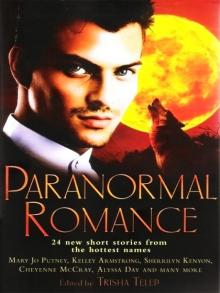 Blue Crush
Blue Crush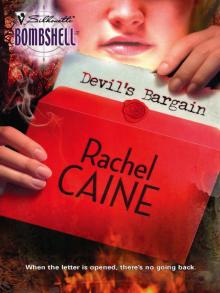 Devil s Bargain
Devil s Bargain Prince of Shadows: A Novel of Romeo and Juliet
Prince of Shadows: A Novel of Romeo and Juliet Bite Club mv-10
Bite Club mv-10 Terminated tr-3
Terminated tr-3 The Morganville Vampires 14 - Fall of Night
The Morganville Vampires 14 - Fall of Night Bitter Blood tmv-13
Bitter Blood tmv-13 Falling for Grace
Falling for Grace The True Blood of Martyrs
The True Blood of Martyrs Fall of Night (The Morganville Vampires)
Fall of Night (The Morganville Vampires) Devil's Bargain rld-1
Devil's Bargain rld-1 The Morganville Vampires (Books 1-8)
The Morganville Vampires (Books 1-8)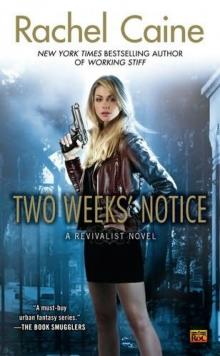 Two Weeks' Notice tr-2
Two Weeks' Notice tr-2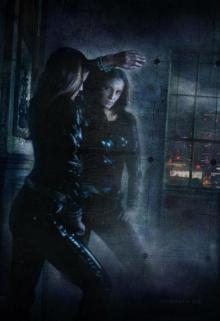 An Affinity for Blue
An Affinity for Blue Caine, Rachel-Short Stories
Caine, Rachel-Short Stories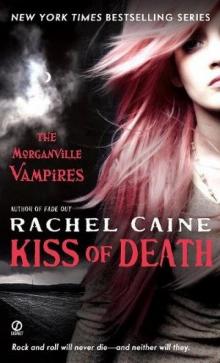 Kiss of Death tmv-8
Kiss of Death tmv-8 WITCHGRAVE
WITCHGRAVE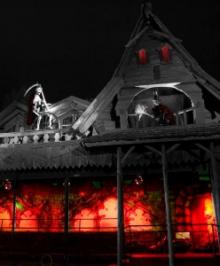 Dark Rides
Dark Rides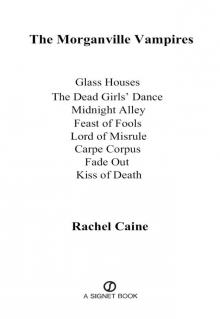 The Morganville Vampires
The Morganville Vampires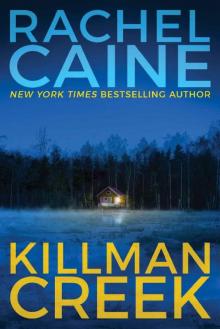 Killman Creek (Stillhouse Lake Series Book 2)
Killman Creek (Stillhouse Lake Series Book 2) Midnight Bites
Midnight Bites Line of Sight
Line of Sight![Morganville Vampires [01] Glass Houses Read online](http://i1.bookreadfree.com/i1/03/30/morganville_vampires_01_glass_houses_preview.jpg) Morganville Vampires [01] Glass Houses
Morganville Vampires [01] Glass Houses Black Dawn tmv-12
Black Dawn tmv-12 Midnight at Mart ww-103
Midnight at Mart ww-103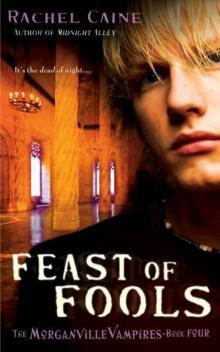 Feast of Fools tmv-4
Feast of Fools tmv-4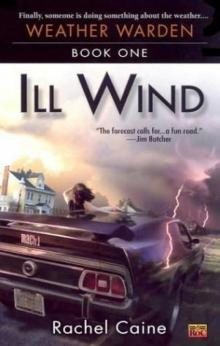 Ill Wind tww-1
Ill Wind tww-1 Devil's Due rld-2
Devil's Due rld-2 Black Dawn: The Morganville Vampires
Black Dawn: The Morganville Vampires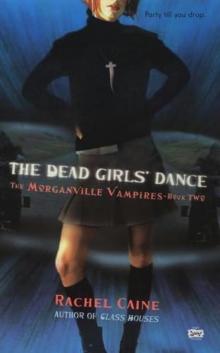 Dead Girls' Dance tmv-2
Dead Girls' Dance tmv-2 Minute Maids
Minute Maids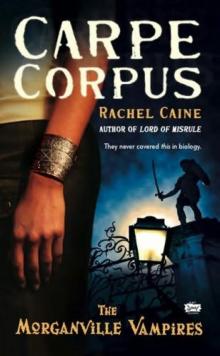 Carpe Corpus tmv-6
Carpe Corpus tmv-6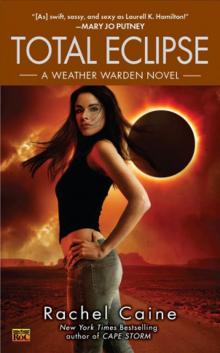 Total Eclipse tww-9
Total Eclipse tww-9 Ghost Town mv-9
Ghost Town mv-9 Lord of Misrule tmv-5
Lord of Misrule tmv-5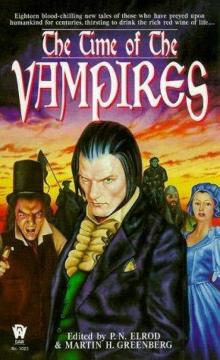 Faith Like Wine
Faith Like Wine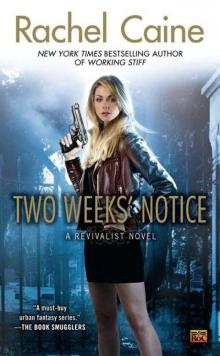 Two Weeks' Notice: A Revivalist Novel
Two Weeks' Notice: A Revivalist Novel Daylighters tmv-15
Daylighters tmv-15 Stamps, Vamps & Tramps (A Three Little Words Anthology)
Stamps, Vamps & Tramps (A Three Little Words Anthology) Unbroken os-4
Unbroken os-4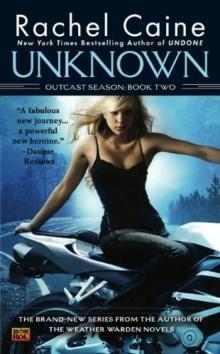 Unknown os-2
Unknown os-2 4 - Unbroken
4 - Unbroken Cape Storm tww-8
Cape Storm tww-8 Last Breath tmv-11
Last Breath tmv-11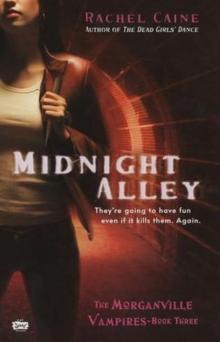 Midnight Alley tmv-3
Midnight Alley tmv-3 Glass Houses tmv-1
Glass Houses tmv-1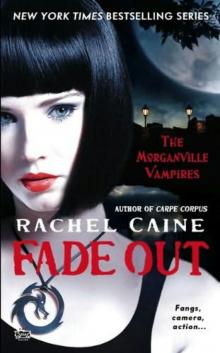 Fade Out tmv-7
Fade Out tmv-7 Fall of Night tmv-14
Fall of Night tmv-14 Godfellas
Godfellas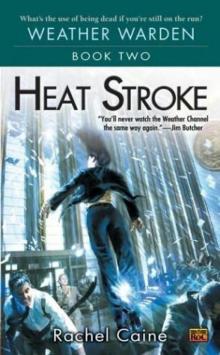 Heat Stroke ww-2
Heat Stroke ww-2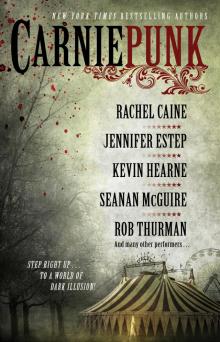 Carniepunk
Carniepunk Oasis ww-102
Oasis ww-102 Gale Force tww-7
Gale Force tww-7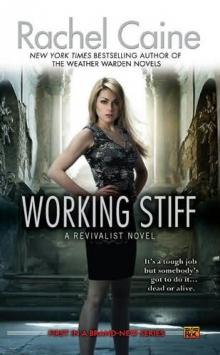 Working Stiff tr-1
Working Stiff tr-1